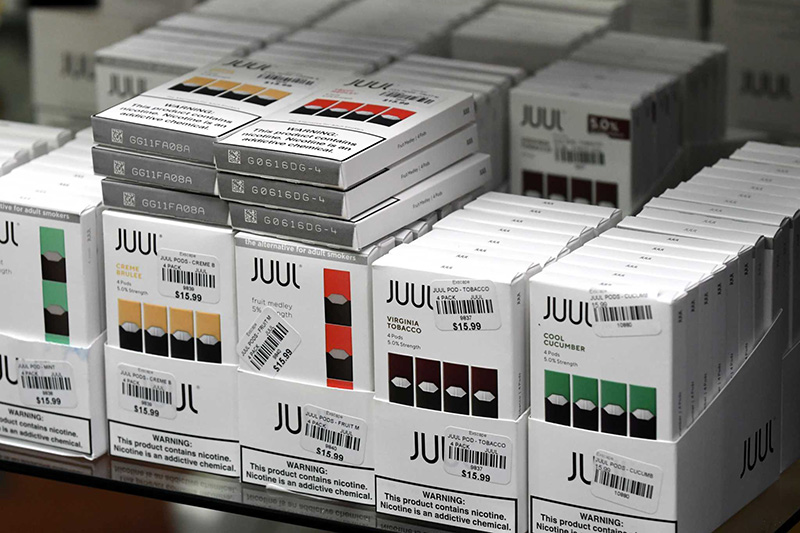Table of Contents [show]

How Did the US FDA Fuck it up so Badly?
Picture this: The sweet scent of freshly baked blueberry pie wafts through the air, tempting your taste buds. But instead of indulging in a delectable dessert, you find yourself surrounded by controversy over e-cigarettes and vaping products. In recent years, the United States Food and Drug Administration (US FDA) has implemented stringent regulations on these popular alternatives to traditional smoking. However, what may have been intended as a protective measure for public health has inadvertently led to devastating consequences for American-made e-liquid companies and countless hardworking individuals.
In this blog post, we delve into the unprecedented impact of the US FDA’s ruling on vaping and shed light on how thousands of jobs were lost in its wake. We explore arguments against these strict regulations while examining alternative solutions proposed by industry experts. Through personal stories from affected businesses and individuals, we gain insight into their struggles amidst an uncertain future. We advocate for a balanced approach that prioritizes both public safety and economic growth within the burgeoning vaping industry.
Join us as we uncover the untold story behind America’s e-liquid crisis – one that highlights not only shattered dreams but also the need for thoughtful regulation that doesn’t stifle innovation or destroy livelihoods. So buckle up; it’s about to get bumpy!
The impact of these regulations
The impact of the FDA’s regulations on American made e-liquid companies has been nothing short of devastating. These small businesses, many of which were thriving and providing quality products to consumers, have been forced to close their doors due to the burdensome requirements imposed by the US FDA.
One of the main challenges these companies face is the Pre-Market Tobacco Application (PMTA) process, which requires them to submit extensive scientific data for each product they sell. This process is not only time-consuming but also prohibitively expensive, with estimates suggesting that it can cost millions of dollars for a single application.
For many small vape juice companies, this financial burden is simply insurmountable. They lack the resources and infrastructure of larger corporations, making compliance with these regulations nearly impossible. As a result, countless jobs have been lost and local communities have suffered economic hardships.
Moreover, these regulations fail to acknowledge that e-liquids are not traditional tobacco products; they do not contain tobacco nor burn like cigarettes. Vaping provides an alternative for smokers who are looking to reduce or quit their habit altogether. By limiting access to e-liquids through excessive regulation, the US FDA may inadvertently push former smokers back towards traditional cigarettes.
Industry experts argue that there should be a more balanced approach when regulating vaping products. Instead of stifling innovation and driving American businesses into bankruptcy, they suggest implementing reasonable safety standards while allowing smaller companies more time and flexibility in meeting regulatory requirements.
It’s important not to overlook the personal stories behind these losses as well – real people who poured their hearts and souls into building successful businesses only to see them crumble under overbearing government regulation. The closure of these small vape juice companies represents shattered dreams and dashed hopes for so many individuals across America.
Loss of jobs and economic impact on local communities
The US FDA’s strict regulations on e-cigarettes and vaping products have had a devastating impact on American made e-liquid companies, leading to a significant loss of jobs and a ripple effect on local communities. These small vape companies, once thriving and contributing to the economy, are now going broke as they struggle to comply with the costly requirements set forth by the US FDA.
For many of these businesses, their employees were not just numbers on a payroll but members of tight-knit communities. The loss of jobs has far-reaching consequences beyond financial hardship. It means families struggling to make ends meet, local shops closing down, and neighborhoods losing their sense of vibrancy.
The economic impact is felt not only by those directly employed in the e-liquid industry but also by suppliers, distributors, retailers, and other related businesses that relied on this thriving market. As these small vape companies go under or scale back operations due to the regulatory burdens imposed by the US FDA, it creates a domino effect throughout entire supply chains.
Furthermore, vape conventions, festivals, and events that used to bring revenue into local economies have been canceled or downsized due to lack of participation from affected businesses.
This has led to losses in tourism dollars for cities that were once hubs for vaping enthusiasts.
It’s important to recognize that this isn’t just about big corporations versus small businesses; it’s about real people facing uncertainty and hardship. Many entrepreneurs who poured their heart and soul into building these companies are now left with shattered dreams and mounting debts.
In an attempt to justify its actions, the US FDA claims that stricter regulations protect public health.
However, it seems misguided when you consider how many former smokers have successfully transitioned away from traditional cigarettes thanks to vaping.
In fact, studies show that vaping can be significantly less harmful than smoking conventional cigarettes.
The FDA should take this evidence into account when crafting regulations, rather than imposing blanket rules that disproportionately harm smaller players in the industry.
Arguments against the US FDA’s strict rules and regulations
- Stifling Innovation: Critics argue that the FDA’s stringent regulations have stifled innovation within the vaping industry. Small vape companies, known for their creativity and unique flavors, are forced to navigate a costly and time-consuming premarket tobacco application (PMTA) process. This makes it nearly impossible for them to compete with larger corporations with deeper pockets.
- Overreach of Authority: Many believe that the FDA has overstepped its boundaries by regulating e-cigarettes as tobacco products. Vaping devices do not contain tobacco; they simply heat liquid nicotine or other substances without combustion. Treating them like traditional cigarettes fails to acknowledge their potential as harm reduction tools.
- Lack of Evidence-Based Approach: Critics argue that the FDA’s regulations are not based on sufficient scientific evidence regarding the long-term effects of vaping compared to smoking traditional cigarettes. While studies have shown that vaping is less harmful than smoking, excessive regulation may deter smokers from switching entirely, missing out on potential health benefits.
- Disproportionate Impact on Small Businesses: The strict rules imposed by the FDA disproportionately affect small vape juice companies, resulting in thousands of job losses across local communities nationwide. These businesses often struggled even before these regulations were introduced due to competition from big players in the market.
5. Preserving Adult Choice: Opponents of heavy-handed regulation emphasize individual liberty and personal choice when it comes to vaping decisions among adults who wish to quit or reduce cigarette consumption but still enjoy nicotine satisfaction through an alternative means.
6. Misguided Focus on Youth Prevention: While youth prevention is important, critics argue that excessively restrictive measures hinder access for adult smokers seeking an off-ramp from combustible cigarettes instead of effectively targeting underage usage through stricter age verification practices and educational campaigns.
It is essential to consider these arguments while discussing policies surrounding e-cigarettes and vaping products since they shed light on valid concerns about unemployment rates, innovation, individual choice, and the potential benefits of harm reduction.
Alternative solutions proposed by industry experts
Industry experts have been proposing alternative solutions to address the concerns raised by the FDA’s strict regulations on e-cigarettes and vaping products. One proposed solution is for the FDA to adopt a risk-based approach rather than an all-encompassing ban. This would involve categorizing different types of vaping products based on their potential risks, such as nicotine content or specific ingredients.
Another suggestion is for the FDA to focus more on educating consumers about the potential health risks associated with vaping. By providing accurate information and promoting responsible use, individuals can make informed decisions about whether or not to use these products.
In addition, some experts argue that implementing stricter manufacturing standards and quality control measures could help alleviate safety concerns without stifling innovation or forcing small businesses out of the market. This would ensure that only safe and properly labeled products are available to consumers.
Furthermore, streamlining the pre-market approval process for new vaping products has been proposed as a way to reduce costs and minimize barriers to entry for smaller companies. Currently, obtaining FDA approval through Pre-Market Tobacco Applications (PMTAs) can be time-consuming and expensive, making it difficult for smaller vape juice manufacturers to comply.
Industry experts believe that finding a balanced approach that addresses public health concerns while also allowing room for growth and innovation in the vaping industry is essential. It is crucial for regulators like the FDA to work closely with stakeholders including manufacturers, retailers, public health officials, and consumer advocacy groups in order to develop effective policies that protect consumers without devastating small businesses or causing job losses.
Personal stories from affected individuals and businesses
The impact of the US FDA’s regulations on e-cigarettes and vaping products is not just a matter of numbers and statistics. Behind every failed business or lost job, there are real people with stories to tell. These personal accounts shed light on the devastating consequences that the US FDA’s rulings have had on individuals, families, and communities.
Take Sarah, for example. She was a small business owner who poured her heart and soul into creating unique flavors for her e-liquid company. With the new regulations in place, she simply couldn’t afford to meet all the requirements set by the FDA for product approval. As a result, her business went under, leaving Sarah unemployed and struggling to make ends meet.
Then there’s Mike, a long-time employee at an American made e-liquid company that had been thriving before these regulations came into effect. He loved his job and took pride in being part of an industry that helped people quit smoking cigarettes. But when his employer shut down due to financial strain caused by compliance costs, Mike found himself out of work overnight.
These are just two examples among thousands of stories echoing across America as small vape companies go broke and workers lose their livelihoods. The economic impact ripples through local communities where once vibrant businesses provided jobs and contributed to local economies.
It’s important to remember that these affected individuals didn’t ask for this predicament; they were blindsided by rules that many argue are misguided in their approach towards regulating vaping products. Critics argue that while it is essential to prioritize safety standards for consumers’ sake, excessive red tape has hindered innovation and stifled competition within the industry.
Experts in the field propose alternative solutions such as implementing tiered regulatory frameworks based on risk assessment rather than applying one-size-fits-all restrictions on all products equally. This would allow smaller businesses like Sarah’s or Mike’s employer more flexibility while still ensuring consumer safety remains paramount.
The personal stories from those affected by the US FDA’s regulations serve as a stark reminder of
Conclusion: The need for a balanced approach in regulating the vaping industry
The vaping industry has faced significant challenges due to the strict regulations imposed by the US FDA. While it is important to prioritize public health and safety, a balanced approach in regulating the industry is necessary to avoid unintended consequences.
Over-regulation has led to devastating effects on small American-made e-liquid companies, resulting in thousands of job losses and economic downturns in local communities. These companies were once thriving businesses that contributed to the growth of the industry and provided employment opportunities for many individuals.
Industry experts have raised valid arguments against the FDA’s stringent rules and regulations. They argue that these measures disproportionately favor big tobacco companies while crippling smaller players who cannot afford costly compliance procedures. This creates an unfair playing field and hampers innovation within the industry.
Alternative solutions proposed by experts include implementing reasonable standards that focus on product safety without stifling competition or pushing small businesses out of existence. A more collaborative approach involving dialogue between regulators, industry stakeholders, and public health advocates can help strike a balance between protecting consumers and supporting economic growth.
Personal stories from affected individuals and businesses highlight the human impact of these regulations. Many hardworking entrepreneurs have lost their livelihoods overnight, with no alternative options available for them in an already challenging job market.
It is crucial for policymakers to consider a more balanced approach when regulating the vaping industry. Striking a fair balance between protecting public health concerns and allowing room for innovation will not only preserve jobs but also foster a healthier marketplace where responsible players can thrive. The need for collaboration among all stakeholders remains essential as we navigate this evolving landscape.
In this article, we have explored the devastating impact of the US FDA’s regulations on e-cigarettes and vaping products. These strict rules and regulations have had a profound effect on American made e-liquid companies, leading to the loss of thousands of jobs and a significant economic downturn in local communities.
Many argue that the FDA’s approach to regulating the vaping industry is misguided. They believe that these regulations are not only destroying small vape companies but also pushing consumers towards unregulated black market products. This poses serious health risks as these illicit products may not meet safety standards or undergo rigorous testing.
Industry experts propose alternative solutions to strike a balance between regulation and innovation. They suggest implementing reasonable guidelines for quality control without burdening small businesses with excessive costs and paperwork. By doing so, they believe it will allow legitimate companies to thrive while ensuring consumer safety.
Behind these statistics are real people whose lives have been upended by the FDA’s ruling on vaping. From ex-employees struggling to find new employment opportunities to business owners who invested their savings into creating high-quality e-liquids, their stories highlight how government policies can directly affect individuals’ livelihoods.
The need for a balanced approach in regulating the vaping industry has become increasingly evident. It is crucial that policymakers consider input from all stakeholders – including small businesses, public health experts, and consumers – when formulating regulations. By promoting innovation while safeguarding public health, we can create an environment where responsible manufacturers can flourish while providing vapers with safe alternatives.
As we navigate through these challenging times, it is essential for us as consumers to stay informed about regulatory developments surrounding e-cigarettes and vaping products. By understanding the issues at hand and supporting initiatives aimed at sensible regulation rather than outright prohibition, we can work towards protecting both our personal freedoms and public health concerns.
Sources Used in This Article:
1) “FDA Rules Threaten Vape Shops“
2) “PMTA Scam: Why the FDA’s Vaping Regulations Don’t Work“
3) FDA Will Maintain Control Over E-Cigarettes … for now




